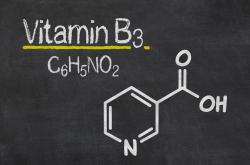The 5 Most Critical Vitamins and Minerals for Fighting Fatigue
Some nutrients are essential for keeping up your energy levels. Learn which vitamin and mineral deficiencies are the most common causes of fatigue, how to diagnose them, and the right way to get your nutrients from both food sources as wells as nutritional supplements.
One of the most common causes for fatigue is a deficiency in one or more of the essential vitamins and minerals the human body needs for consistently high levels of energy.
To understand how this deficiency can impact your energy level and your health, it is important to learn how vitamins and minerals can help you in your fight against the effects of fatigue, and which ones are the most important components in that fight.
What Are the 5 Most Important Vitamins and Minerals in the Fight Against Fatigue?
The body requires an impressive array of vitamin and mineral nutrients to function properly. Some are required for the immune system, others assist in various metabolic and other processes, and still others enhance vitality or other areas of health. All must be in the proper balance for good health and consistent energy levels. With that said, there are 5 vitamins and mineral deficiencies that are most commonly associated with fatigue:
- Iron
- Magnesium
- Vitamin B-12
- Vitamin D
- Folic Acid
When doctors hear complaints from patients about fatigue symptoms, one of the first things they do is check for deficiencies in these critical vitamins and minerals. Many won’t even consider the possibility that other conditions are involved until these five deficiencies have been ruled out as a possibility.
Iron Deficiency
What is Iron and How Does it Benefit You?
Iron is an essential mineral that the human body relies on for energy production. It not only supports the creation of the energy we need for life, but aids in the transport of the oxygen that delivers nutrients to the cells for conversion into energy. Without iron, the red blood cells lose their ability to function properly. Over time, that leads to anemia.
The reason this deficiency causes fatigue is simple: your body relies on red blood cells – and the hemoglobin in those cells – to carry oxygen to where it is needed for energy conversion. Because anemia directly impacts the amount of oxygen that can be transported throughout the body, the production of energy can become severely disrupted.
How Do You Know if You Suffer From Iron Deficiency?
Fatigue and muscle weakness are among the most common signs of iron deficiency. Sadly, most people don’t realize the net effect of these symptoms until they are already anemic. This is especially common among women, who often struggle to maintain the right levels of iron in their bodies. Excessive exercise can also deplete iron stores over time.
How to Diagnose Iron Deficiency
Your doctor has a variety of tests that can be used to diagnose iron deficiency and anemia. These include blood tests that examine the size and hue of red blood cells, and the volume of those cells in your blood. Hemoglobin levels are also examined, as is the level of ferritin protein in the body.
If iron deficiency anemia is found with these tests, then other testing may be conducted to identify or rule out potential causes for the deficiency. These can include everything from a colonoscopy and endoscopy to an ultrasound.
Food Sources for Iron
Meats are one of the best known sources for dietary iron, and can provide pretty much all the iron most people need. That’s why so many recommendations focus on food like beef and sardines. However, there are many plant sources as well, including green leafy vegetables and legumes. Whole grains and several spices also provide this essential mineral.
How to Supplement Iron
Iron supplementation can be deadly, so patients are strongly cautioned against taking iron supplements of any kind without a recommendation and guidance from a competent physician.
Potential Side Effects and Interactions
Iron absorption can be increased dramatically from food source when vitamin C is consumed at the same meal. Vitamin A also interacts with iron, in that insufficient levels of vitamin A can result in an inability for the body to properly use its iron stores to manufacture red blood cells.
For more information, See Understanding the Importance of Iron and Iron Deficiency Anemia.
Magnesium Deficiency
What is Magnesium and How Does it Benefit You?
Magnesium is an essential component of the metabolic process, and one that is needed for everything from bone integrity to balancing calcium levels. From a fatigue standpoint, magnesium’s importance in the creation of energy cannot be overemphasized. This mineral is a co-factor that allows enzymes to do their job during the energy manufacturing process. Magnesium also helps to control blood sugar and reduces inflammation.
When your magnesium levels are too low, your mitochondrial energy factories will be unable to generate the ATP you need to fuel your body. In addition to that direct impact on energy production, low magnesium levels also leave those mitochondria vulnerable to damage from free radicals, which can lead to the very type of inflammation that is often seen in cases of severe fatigue.
How Do You Know if You Suffer From Magnesium Deficiency?
Fatigue is the primary sign of low magnesium, as the body ends up struggling to produce the energy it needs for normal function. Depression and irregular blood sugar levels are also common. Heart complications can also be a strong indication that magnesium levels are too low. Extreme levels of hunger and thirst are often seen in cases of severe magnesium deficiency.
How to Diagnose Magnesium Deficiency
Diagnosing magnesium deficiency is no easy task, since most of it is contained in the cells and bones, with very small concentrations in the blood. However, a blood test is still the preferred method for measuring the amount of this mineral present in the body. Because there is so little magnesium In the blood, patients are advised to avoid antacids, diuretics, and other medicines and supplements that contain the mineral for at least three days prior to the test.
Food Sources for Magnesium
Magnesium can be obtained from beet greens, spinach, legumes such as pinto beans and kidney beans, and a variety of seeds. Brown rice and barley also have a high level of magnesium, and the mineral is often found in drinking water as well.
How to Supplement Magnesium
About 400 mgs of magnesium on a daily basis can be sufficient for most adults, with a smaller amount for children. It is wise to talk to a physician, however, so that he can aid you in determining the proper ration of magnesium to calcium, since those two minerals need to be in balance to work properly.
Potential Side Effects and Interactions
There is very little risk of toxicity from magnesium. Loose stools appear to be the most common complaint, but are also usually related to other factors such as diet. As such, there is no real danger of consuming too much magnesium. However, as noted above, excessive magnesium consumption can pose other problems if it is not carefully balanced with calcium levels.
For more information, see Understanding the Importance of Magnesium
Vitamin B12 Deficiency
What is Vitamin B12 and How Does it Benefit You?
An important member of the B-complex family with which we should be concerned is vitamin B12 – also known as cyanocobalamin. Another soluble vitamin that aids the adrenals and central nervous system, B12 does more than just fulfill a role in the metabolic process and protect nerve cells. It is also essential for synthesizing DNA.
Vitamin B12 helps the body develop red blood cells, as well as nerve cells and the protective covering that keeps those cells safe from harm. It is responsible for assisting in the creation of essential neurotransmitters, RNA, and DNA. When the levels of this vitamin are low, cell division can be impaired, resulting in enlargement of red blood cells and an exaggerated response on the part of the immune system. Fatigue occurs as the body’s energy production is disrupted.
How Do You Know if You Suffer From B12 Deficiency?
When B12 levels are too low, the signs can be severe. In addition to fatigue and weakness in the muscles, patients also exhibit dizziness, shortness of breath, nausea, diarrhea, and appetite problems. These symptoms seldom present themselves collectively, but rather tend to build up over time. In some cases, a deficiency can even lead to pernicious anemia – a condition that causes brain fog, loss of memory, dementia, and even death.
Most people who eat meat on a regular basis – or animal products of any kind – are relatively free from these deficiencies. They tend to afflict vegetarians and vegans, especially the young. As people get older, however, their bodies can lose the ability to efficiently absorb B12. Pregnant women also struggle with absorption issues.
How to Diagnose B12 Deficiency
As with most vitamin and mineral deficiency diagnoses, a blood test is typically used to check B12 levels. Red blood cells are examined for abnormalities in appearance and unusually low levels. Folate and vitamin C levels are also examined during these tests.
If the levels of B12 are found to be low, doctors commonly conduct tests to evaluate antibodies in the blood for the purpose of confirming or ruling out pernicious anemia as a cause. They can also measure methylmalonic acid levels, and sometimes perform the Schilling test as well.
Food Sources for Vitamin B12
B12 comes from animal products. That includes not only meat, poultry, shellfish, and fish, but eggs and various dairy products as well. Because B12 sources are animal-based, people who avoid these foods should consider supplementation.
How to Supplement Vitamin B12
2.8 micrograms a day is the recommended allowance for adults. While that seems like a tiny amount, many people need much more than that to ensure that they absorb a sufficient quantity to provide for their bodies’ needs. Experts recommend a daily multivitamin containing 50 mcg of the nutrient. Children need around .4 mcg to 1.8 mcg, while the elderly are encouraged to aim for somewhere between 50 and 100 mcg a day to counter their natural tendency to resist absorption.
Potential Side Effects and Interactions
B12 is nontoxic and safe. Antibiotics, alcohol, diabetes medications, nicotine, and acid relief medications can all inhibit absorption or otherwise lower B12 levels. Finally, potassium and vitamin C supplements negatively impact the vitamin as well, with potassium hindering absorption and vitamin C blocking acquisition from food sources.
For more information, see Why Your Fatigue Could Mean You Suffer from Vitamin B12 Deficiency
Vitamin D Deficiency
What is Vitamin D and How Does it Benefit You?
Vitamin D has often been referred to as the “sunshine vitamin: and for good reason: the D3 form of this vitamin can be synthesized by the human body within minimal exposure to direct sunlight. It is a rare micronutrient that the body creates on its own. It is critical for helping to absorb calcium to promote the right kind of bone mineralization. It also plays a role in preventing rickets, and provides strength to the immune system. New research indicates that vitamin D may also help people avoid autoimmune conditions like MS and diseases such as cancer.
Research indicates that it is vitamin D’s interaction with melatonin that lies at the heart of its impact on fatigue. Since melatonin is the chemical the body uses to prepare you for sleep, inadequate levels of this vitamin result in increased levels of melatonin, and reduced energy levels.
How Do You Know if You Suffer From Vitamin D Deficiency?
Vitamin D deficiency is typically revealed through symptoms such as fatigue, weak bones, and weakened muscles. While it might seem odd that people would suffer deficiency with a vitamin they can produce in their bodies, it actually makes sense. People at northern latitude and those with darker pigmentation often have difficulty getting the type of sunlight needed to synthesize this vitamin on their own.
How to Diagnose Vitamin D Deficiency
A 25(OH)D blood test is considered by many to be the only sure way to determine a deficiency in this vitamin. The best option is, of course, to consult your physician to have this test conducted. However, there are also at-home tests that can be ordered online.
Food Sources for Vitamin D
Most fortified foods like milk and cereals are fortified with the plant form of vitamin D – which the body has a harder time using. There are few actual sources for the type of D most people need, but some do exist: eggs, tuna, mackerel, salmon, and sardines are the main options. The best source is, of course, sunlight.
How to Supplement Vitamin D
Adults only need around 5 mcg a day to maintain health, though that rises as people get older. When you buy supplements, be sure to get the D3 form rather than the less effective D2 variety. Children’s requirements are roughly the same as adults.
Potential Side Effects and Interactions
There are no known side effects from supplementing vitamin D, and no known interactions of note.
For more information, see Vitamin D Deficiency and Fatigue
Folic Acid Deficiency
What is Folic Acid and How Does it Benefit You?
Folic acid is sometimes known as folate, vitamin M, or vitamin B9. This B-complex, water-soluble vitamin serves along with other B vitamins in protecting adrenal activity, regulating a calm and peaceful nervous system, and performing various metabolic functions. It is essential for growth and nerve and brain functions. It also helps to prevent heart disease, colon and lung cancer, and age-related memory impairment.
Because folic acid aids in the production of red blood cells, any deficiency in this vitamin can cause a disruption in that production. That leaves the body unable to transport sufficient levels of oxygen to the cells for energy conversion, results in anemia, and causes fatigue.
How Do You Know if You Suffer From Folic Acid Deficiency?
Deficiency can be a serious matter, causing failed pregnancies, firth defects, cervical issues, memory loss, and depression. It most commonly occurs in women who are pregnant, alcoholics, and institutionalized persons.
How to Diagnose Folic Acid Deficiency
Blood tests are used to measure the levels of folic acid in the blood and evaluate your red blood cell count. At the same time, B12 levels are usually checked as well since insufficient levels of that vitamin can cause many of the same symptoms.
Food Sources for Folic Acid
Many foods are fortified with folic acid. These include cereals, many baked goods, and processed orange juice. Beans, spinach, and green vegetables also provide it, as do bananas, lemons, and melons.
How to Supplement Folic Acid
The 400 micrograms recommended for adults can be easily obtained through the use of a daily multivitamin that contains the B-complex family. Pregnant women may need a different dose, and should consult with their physician to ensure that they get the right amount. Children need as little as 65 mcg, but that rises to 300 mcg by the time they approach their teen years.
Potential Side Effects and Interactions
Folic acid is considered safe even in high doses, though some minor side effects may appear if the supplement has the effect of hiding signs of the life-threatening disease known as pernicious anemia, which is related to B12 deficiency. Any dose over 15,000 micrograms – about thirty-seven times the recommended amount – can result in insomnia, seizures, and various stomach ailments.
For more information, See The Role of the Vitamin B Group in Maintaining Health and Energy
A Final Note
While there are certain minerals and vitamins detailed here that can be safely managed on your own through diet and supplementation, some – like iron – are risky to manipulate without a physician’s advice. For that reason, you should always consult with your doctor so that he or she can verify the actual levels of these critical vitamins and minerals to determine the best dietary and supplement strategy for you.
With that said, a better understanding of the important role played by these vital nutrients can help you to more effectively manage your health and recognize why you experience fatigue. With that understanding, you can more effectively participate in your own medical care and work with your physician to ensure that you have enough essential vitamins and minerals.
You might also be interested in:
- Important Vitamins for Fatigue. http://www.livestrong.com/article/260387-important-vitamins-for-fatigue/
- 8 Best Minerals and Vitamins to Fight Fatigue. http://www.motherearthnews.com/natural-health/8-best-minerals-and-vitamins-to-fight-fatigue-zbczD405.aspx
- Foods to fight fatigue. http://www.faqs.org/oc/Overcoming-Fatigue/Foods-to-fight-fatigue.html
- 10 Vitamin or Mineral Deficiencies Related to Fatigue. http://dailyhealthpost.com/10-vitamin-or-mineral-deficiencies-related-to-fatigue/
- Iron Deficiency Anemia. http://www.mayoclinic.org/diseases-conditions/iron-deficiency-anemia/basics/tests-diagnosis/con-20019327



















Leave a comment